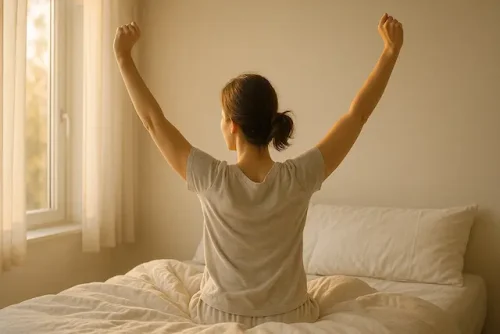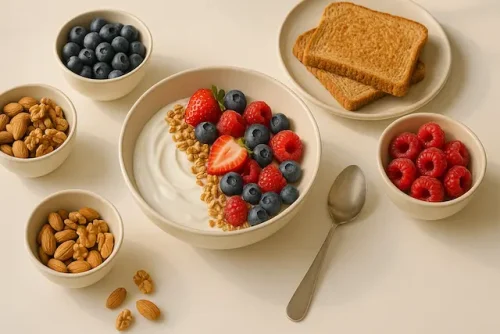
Tiny Habits for Mental Health: 10 Daily Steps to Feel Better Every Day
Small changes can make a meaningful difference in how you feel each day. When you focus on tiny habits for mental health, you build momentum without adding pressure or complexity. These simple actions fit easily into a busy schedule and help you feel more balanced over time.
In this article, we will explore how small daily steps can support your mental well-being and introduce practical habits you can start today.
What small habits improve mental health every day?
Small habits improve mental health when they are easy to repeat, support emotional balance, and help you stay grounded throughout the day. Adding daily habits for mental health, such as movement, brief check-ins, or gratitude moments, builds long-term stability and supports better mood regulation.
When you focus on habits that take only a minute or two, you remove the pressure to make large changes. These actions are easier to maintain and often create a ripple effect in other areas of your life.
Here are examples of small habits that support mental well-being daily:
- A one-minute breathing reset after waking up
- A short walk to increase movement and improve clarity
- A simple nutrient-rich food swap at one meal
- A brief gratitude moment during your day
- A micro break to reduce stress and reset attention
These habits encourage consistency, which is key to building mental resilience. Even if you start with one or two, you will notice subtle shifts in your energy, focus, and emotional stability.
How can you start your day with a tiny habit that boosts mental health?
You can start your day with a tiny habit that boosts mental health by doing a short morning reset that includes slow breathing and a simple intention. This small routine helps you feel grounded and supports daily habits for mental health by setting a calm emotional tone before the day becomes busy.
A short morning reset works because it interrupts the common rush that begins the moment you wake up. Instead of reaching for your phone, you give yourself a brief moment of presence and clarity.
Here is a simple morning habit you can try:
- Sit up slowly and take three steady breaths
- Stretch your arms to release tension
- Think of one thing you appreciate or look forward to
- Set a small intention such as stay patient or stay focused
This routine takes less than a minute and supports emotional wellness by helping your mind shift into a steady rhythm. You can adjust the steps as needed, as long as the goal remains the same: begin your morning with a moment that anchors your attention and sets the tone for the day.
What daily habits for mental health can you add through small nutrition tweaks?
You can add daily habits for mental health through small nutrition tweaks by choosing simple, nutrient-rich additions that support steady energy and mood. These steady routines work best when they are easy to maintain and focus on adding helpful foods rather than restricting choices.
Food choices influence how you feel throughout the day. When your meals support stable blood sugar and provide key nutrients, you tend to experience better focus and emotional balance.
You can begin with small, achievable changes:
- Add berries or a fruit serving to your healthy breakfast
- Swap a processed snack for nuts or yogurt
- Include one extra vegetable in your lunch or dinner
- Drink water before your first coffee
- Choose whole grain options when possible
These adjustments help support overall mental resilience without requiring major changes to your diet. By focusing on small additions, you build a routine that supports long term emotional wellness while staying flexible and sustainable.
How can you sneak movement into your routine to improve mental well-being daily?
You can sneak movement into your routine to improve mental well-being daily by adding short bursts of activity during tasks you already do. These simple habits work because brief movement increases circulation, supports clarity, and boosts energy without needing a structured workout.
You do not need long exercise sessions to benefit. When you add small movement breaks, you support both your body and mind in a low-pressure way.
Simple ways to add movement into your day include:
- Take a short walk during a phone call
- Stand and stretch after every hour of sitting
- Do calf raises or squats while waiting for water to boil
- Walk a few minutes after lunch for better focus
- Use stairs when it fits your schedule
These small movement practices create helpful rhythm shifts in your day. Over time, this routine supports mental resilience, improves mood, and gives you steady energy without requiring extra planning.
Read More: How to Lose Weight in One Month Naturally
What tiny habits strengthen connection and reduce feelings of loneliness?
Tiny habits strengthen connection and reduce feelings of loneliness by creating brief, meaningful interactions that help you feel supported throughout the day. These supportive actions work because consistent social touchpoints build a sense of belonging without requiring major effort.
Many people imagine connection as long conversations or planned activities. In reality, micro moments of interaction can be just as valuable for emotional wellness.
You can try simple connection habits such as:
- Send a quick message to a friend while taking a break
- Share a light update or photo with a family member
- Make brief eye contact and smile at someone you meet
- Start a short conversation with a coworker or neighbor
- Respond to one message you have been putting off
These actions may feel small, but they help bridge gaps and create momentum toward deeper relationships. Over time, these tiny habits offer steady emotional support and reduce the sense of isolation many people experience during busy days.
How can you manage digital distractions with small healthy habits?
You can manage digital distractions with small healthy habits by setting simple boundaries that limit interruptions and support better focus. These practical habits work because reducing screen overload helps you stay present and prevents unnecessary stress throughout the day.
Digital distractions often build up quietly. A few notifications or quick checks can quickly pull your attention away from what matters and leave you feeling mentally scattered.
Practical ways to reduce distractions include:
- Leave your phone in another room during meals
- Turn off non-essential notifications for a few hours
- Create a short screen-free block during your morning or evening
- Move distracting apps away from your home screen
- Use a simple timer to focus for short intervals
These steps help you regain control of your attention and support clearer thinking. Over time, these habits build mental resilience by giving your mind regular breaks from constant digital noise.
How does practicing spot gratitude help boost your mental health?
Practicing spot gratitude boosts your mental health by shifting your attention toward positive moments as they happen. These daily steps help reduce stress, increase awareness, and support a more balanced emotional outlook throughout the day.
Spot gratitude works because it is simple and does not require a journal or long reflection session. You notice something positive in real time and acknowledge it for a few seconds.
You can practice spot gratitude through actions like:
- Noticing warm sunlight when you step outside
- Appreciating the taste of your first sip of coffee
- Recognizing when a task feels easier than expected
- Taking a moment to enjoy a quiet pause
- Acknowledging when someone shows kindness
These brief moments support emotional wellness by training your mind to notice small wins instead of rushing past them. Over time, these habits help you stay grounded and create a more optimistic daily rhythm.
How do periodic mental check-ins support emotional resilience?
Periodic mental check-ins support emotional resilience by helping you notice your feelings early and respond before stress builds up. These supportive routines create space to slow down, observe your thoughts, and choose a steadying action when you need it.
A mental check-in does not need to be long. You simply pause and ask yourself how you feel, what might be causing that feeling, and what small step could help you move forward.
You can complete a check-in by asking simple questions:
- What emotion am I feeling right now
- What event or thought triggered it
- What small action could help me feel steadier
You can build this habit into natural parts of your day:
- During meals
- Before starting a new task
- At the end of a work block
- During your commute
- Before bed
These short pauses help you understand patterns, reduce reactivity, and support emotional clarity. Over time, this practice becomes a foundation for long-term mental resilience.
What is a worry window, and how does it reduce stress throughout the day?
A worry window is a short, scheduled time when you allow yourself to think through concerns, which helps reduce stress by preventing constant rumination. These thoughtful practices work because they create boundaries around worry and give your mind space to focus on the rest of your day.
Worry often feels overwhelming when it shows up at random moments. A worry window gives those thoughts a clear place to go, which helps you feel more in control.
You can set up a simple worry window by:
- Choosing a time of day that feels calm, such as late afternoon
- Limiting the window to five or ten minutes
- Writing down the worries that come to mind
- Stopping when the timer ends
- Saving the list for the next scheduled window if needed
This habit supports mental resilience by separating real problem-solving from unstructured worry. Over time, your mind becomes less reactive because it knows there is a designated moment to process concerns.
How does shifting from perfection to progress improve mental well-being?
Shifting from perfection to progress improves mental well-being by reducing pressure and helping you focus on steady growth rather than flawless results. These simple actions support a healthier mindset by making daily tasks feel more manageable and less draining.
Perfection can create unnecessary stress because it places your attention on what is missing instead of what is working. A progress mindset encourages small steps that build confidence over time.
You can practice a progress-focused approach by:
- Completing tasks in short blocks rather than waiting for ideal conditions
- Acknowledging one or two things you finished today
- Choosing good enough for routine tasks
- Celebrating small improvements rather than final outcomes
- Giving yourself permission to rest when needed
These habits support emotional wellness by helping you see value in the effort you put in each day. Over time, this shift reduces self-judgment and encourages a more balanced and sustainable rhythm at work and home.
What tiny habits help you wind down and sleep better at night?
Tiny habits help you wind down and sleep better at night by signalling to your mind that it is time to slow down and prepare for rest. These calming routines support better sleep quality, which plays an essential role in mood, focus, and overall emotional stability.
Even a short evening routine can make a noticeable difference. The goal is to create a calm shift between your day and your night.
You can try simple sleep supporting habits such as:
- Putting your phone away ten minutes earlier
- Reading a few pages of a book or listening to soft music
- Doing light stretches to release tension
- Drinking a warm caffeine-free beverage
- Dimming lights to ease your mind toward rest
These steps help you settle your thoughts and ease your body into a slower rhythm. Over time, consistent night routines support mental resilience by giving you deeper, more restorative sleep that carries into the next day.
What are the 10 signs your mental health is improving from tiny habits?
The signs your mental health is improving from tiny habits include steadier mood, better focus, and a greater sense of daily balance. These supportive behaviors create subtle but noticeable shifts that build confidence and support long-term emotional wellness.
These signs often appear gradually as your routines become more consistent. You may not notice each change immediately, but together they show meaningful progress.
Common signs of improving mental health include:
- You recover from stress a little faster
- You feel more patient in daily situations
- Your sleep becomes more consistent
- You notice small positive moments more often
- You take quick breaks before becoming overwhelmed
- You feel more present in conversations
- Your thoughts feel a bit clearer
- You make decisions with less hesitation
- You feel more connected to others
- You experience fewer spikes in worry throughout the day
These small changes show that your habits are working. Over time, these improvements strengthen your emotional resilience and help you maintain better mental well-being in a sustainable way.
What behaviors improve mental health that people often overlook?
Behaviors that improve mental health habits and are often overlooked include simple actions like getting sunlight, taking short pauses, and practicing steady breathing. These practical behaviors support better mood and focus by giving your mind regular moments of rest and balance.
Many people assume that mental wellness requires major lifestyle changes. In reality, overlooked actions can make a steady difference when practiced consistently.
Some often overlooked habits include:
- Getting a few minutes of morning sunlight for natural alertness
- Taking brief movement breaks during long sitting periods
- Pausing to take slow, steady breaths during stressful moments
- Spending a short time outdoors to reset your attention
- Keeping your workspace clear to reduce mental clutter
These behaviors may seem small, but they create helpful shifts in your daily rhythm. Over time, these simple adjustments support emotional wellness and help you navigate stress with greater ease.
How can tiny habits for mental health help you build long-term emotional resilience?
Tiny habits for mental health help you build long term emotional resilience by creating consistent routines that strengthen your ability to handle stress and adapt to daily challenges. These steady routines support clearer thinking and emotional stability by giving your mind regular moments of care.
Resilience is not built through major changes. It grows through small, repeatable behaviors that train your mind to stay flexible and grounded.
You can build long-term resilience through habits such as:
- Using short breathing pauses during busy moments
- Adding brief movement throughout the day to reduce tension
- Practicing small gratitude moments that shift your attention
- Checking in with your emotions before reacting
- Setting simple digital boundaries to protect focus
These actions form a supportive structure in your daily life. Over time, this structure becomes a reliable foundation that helps you stay steady, manage stress more effectively, and maintain stronger emotional wellness.
Final thoughts
Tiny habits are powerful because they fit naturally into your day and create steady progress without pressure. When you choose simple actions that support your mind, you give yourself a foundation that grows stronger over time. You do not need dramatic changes to feel better. You only need small steps that you can repeat.
If you stay consistent with even one or two of these habits, you will begin to notice more clarity, more balance, and a calmer rhythm to your day. These shifts are signs that you are moving in the right direction and building a healthier pattern for your long-term mental well-being.
Frequently Asked Questions
Q: What is the 3-3-3 rule in mental health?
A: The 3-3-3 rule in mental health is a quick grounding technique where you name three things you see, three things you hear, and move three parts of your body to calm your mind and improve mental well-being daily.
Q: What is the 5 4 3 2 1 rule for anxiety?
A: The 5 4 3 2 1 rule for anxiety guides you to notice five things you see, four you can touch, three you hear, two you smell, and one you taste, helping reduce stress and support simple mental health habits.
Q: What is the #1 worst habit for anxiety?
A: The #1 worst habit for anxiety is constant worry spirals, because repetitive overthinking fuels stress and blocks tiny habits for mental health that promote emotional resilience.
Q: What are the 10 small things neurologists wish you would do for your brain?
A: The 10 small things neurologists wish you would do for your brain include daily movement, quality sleep, hydration, balanced nutrition, mental stimulation, social connection, sunlight, mindfulness habits, stress-reducing daily practices, and mini self-care habits that support long-term brain health.
Q: What are 5 warning signs of stress?
A: The 5 warning signs of stress include irritability, trouble sleeping, constant tension, difficulty concentrating, and physical symptoms like headaches, signals that simple mental health habits can help restore balance.
Q: What is the 3-minute rule for reducing stress?
A: The 3-minute rule for reducing stress encourages you to pause for three minutes to breathe slowly, notice your surroundings, and reset your focus, giving your mind a quick break and supporting tiny habits for mental health.





